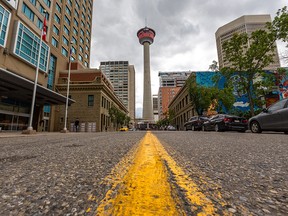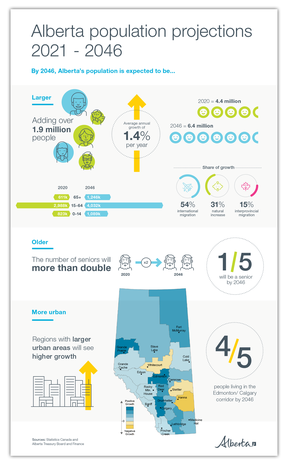Since last July, more Canadians have relocated to Alberta from other provinces than have left

Article content
Attending a Toronto conference this week to promote Calgary’s tech sector, Mayor Jyoti Gondek found some receptive soil to plant a message to workers who might be considering a move to Stampede City.
Advertisement 2
Article content
Calgary has open tech jobs — more than 4,300 by one count — along with a growing number of start-up firms and an affordable quality of life.
It didn’t hurt that Calgary was just named the third-most liveable city in the world by the Economist Intelligence Unit (tied with Zurich), and ahead of Vancouver and Toronto.
Reasonable commute times and housing prices that are half the level seen in Canada’s largest city also help the messaging.
“There are many people we spoke to here that said they’re having a hard time making ends meet because it’s expensive to be in Toronto,” Gondek said in an interview.
“It’s less expensive to live here and it’s beautiful. So I think Calgary’s competitive advantage is two-fold: We’ve grown the ecosystem in a way that we have a critical mass of people, and we’re also ranking even higher than before in terms of quality of life.”
Advertisement 3
Article content
It’s no surprise a city’s mayor would tout her hometown as a great place for any company — not just tech — to set up shop.
It comes with the job description.
Yet, as Alberta recovers from the COVID-19 pandemic, some signs back up the belief.
After several miserable years of a population drain, more people are moving here from other parts of Canada.
Since last July, more Canadians have relocated to Alberta from other provinces than have left, including 5,351 residents between January and March — the strongest growth recorded in almost seven years, according to data released this week.
The biggest contribution came from Ontario.
It wasn’t very long ago that the moving trucks were generally headed in the other direction. After oil prices detonated in 2015, layoffs reverberated throughout the industry and the economy sputtered.
Advertisement 4
Article content
The province lost nearly 18,000 people in the net interprovincial shuffle the next year. Nearly 6,000 left during the first year of the pandemic.
Now, the tide has turned.
“It’s a trend, but we don’t know yet if it’s a lasting trend,” cautioned Janet Lane, director of the Human Capital Centre at the Canada West Foundation.
“It is good news for Alberta that we have a lot of open jobs. We have jobs that are for everybody, not just people with high levels of post-secondary education.”
In a study released this spring, the think-tank found Alberta lost an average of about 1,100 young adults (aged 25 to 29) between 2015 and 2021, reversing past population flows.

Younger adults regularly move for education, employment, or family reasons, but it’s an ominous long-term trend if they’re persistently departing because they don’t see a future at home. (The latest population report doesn’t break down the ages of people moving between provinces.)
Advertisement 5
Article content
It’s clear the overall employment picture has improved in the past year.
A TD Economics report released Wednesday projects Alberta’s economy will lead the country this year, growing by 5.5 per cent.
In May, Alberta’s jobless rate dropped to 5.3 per cent, its lowest point since early 2015.
By the first quarter of this year, the province had 88,000 vacant jobs — and 96 per cent were outside the oil and gas industry, Lane noted.
Workers are needed in areas such as agri-food, energy, film and television, health care and accommodations.
“There are some really good things happening, but there’s some work still to be done on the inclusivity and vibrancy piece that young people are looking for as well,” added Lane.
ATB Financial chief economist Rob Roach expects the influx of people from other provinces will continue as more jobs are created and the economy grows.
Advertisement 6
Article content
“People really do vote economically with their feet,” he said.
While the economy is diversifying, Roach pointed out oil and gas extraction have made up an average of about one-quarter of Alberta’s GDP over the past decade. With high prices, the province’s bread and butter industry is doing well this year.
The paradox is that diversification is also helping make the province more attractive to outsiders.

“People want to move for different reasons or different types of jobs,” he added.
“It’s not like in the old days where it was just one (sector), ‘Oh, oil and gas are doing great, that’s the full story.’ There’s more to it, but oil and gas are still right at the heart of it.”
Affordability is also playing in the province’s favour. The average selling price for a home in Toronto sat at $1.2 million in May. In Calgary, the benchmark price was $546,000.
Advertisement 7
Article content
For Calgarians, the share of household income needed to cover their ownership costs (including mortgage payments, taxes and utilities) sat at 35 per cent in the first quarter of the year, according to RBC Economics.
In Toronto, it was 75 per cent, eclipsed by Vancouver at an eye-watering 82 per cent, the bank found.
At the Collision technology conference, Calgarian Brett Colvin spoke with many people in the industry who were curious about what was going on in the city.
They asked the CEO of Goodlawyer, a legal services start-up based in Calgary, about the size of the local tech ecosystem, jobs and the affordability of office space.
“They’re asking more questions, that’s what I noticed, and are more receptive to the idea of moving to Calgary. If I go back to when we first started Goodlawyer, we came out to Toronto, nobody in the start-up world had any interest in Calgary,” Colvin said Friday.
“It’s still very early days…but hopefully, this conference, that event, will spark that curiosity into some serious movement into our province.”
Chris Varcoe is a Calgary Herald columnist.
Varcoe: 'Vote with their feet' — more people moving to Alberta as economy gains traction - Calgary Herald
Read More
No comments:
Post a Comment